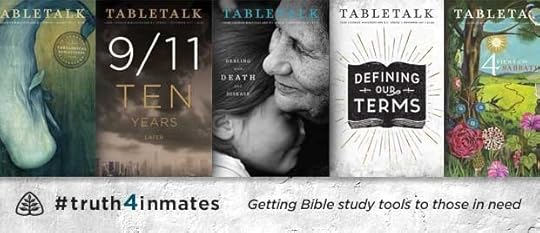R.C. Sproul's Blog, page 559
November 20, 2011
Twitter Highlights (11/20/11)
Here are some highlights from the various Ligonier Twitter feeds over the past week.

Reformation Trust #JohnCalvinFact "he wrote full commentaries on 24 / 39 books in the OT & all of the NT books except 2 & 3 John & Rev." bit.ly/eaos1h

Ligonier The sinner in hell would give everything that he had...to make the number of sins in this world that he had committed one less. -R.C. Sproul

Reformation Trust What children need to see is not a perfect mom or dad...They need to see in us an unwavering commitment to Jesus -Beeke bit.ly/njTRMB

Ligonier God's graciousness...is not totally removed from any individual during this lifetime, but in hell, it is... -R.C. Sproul

Reformation Bible College "Take away the cross and you take away the justice and righteousness of God" - Dr. Sproul, President of RBC

Tabletalk Magazine When man — apart from Christ — is most religious, he is most rebellious (Waters).

Reformation Trust Not everyone who hears the Word of God is saved, & the same is true for many who respond to it initially. —R.C. Sproul bit.ly/j0LHcw

Ligonier Jesus does not invite us to come and hang out with Him. He calls us to die to self. -John Sartelle bit.ly/vvzKCh
You can also find our various ministries on Facebook:
Ligonier Ministries | Ligonier Academy | Reformation Bible College
Reformation Trust | Tabletalk Magazine

4 Interpretive Guidelines for Understanding Jesus' Parables
1. Don't treat parables like allegory.
An allegory is most often completely filled with symbolic meaning. Every detail means something that can be traced to the overriding principle that is being illuminated. Parables usually have one basic, central meaning. Trying to oversymbolize them can have the effect of tearing them apart. A person doesn't understand the beauty of a flower by disassembling it. Like a blossom, a parable is best understood by seeing it in its simple and profound entirety.
2. The Rule of Three.
Like all good storytelling, parables usually follow the Rule of Three. Do you remember the stories you heard as a child—such as “The Three Little Pigs” and “The Three Bears”? Both of these stories are filled with more “threes”: three wolves, three beds, three bowls of porridge. Jesus did this often in the telling of the parables. And is it any wonder that many parables deliver three important truths or that most sermons rest on three important points?
3. The Rule of Two.
Parable characters often follow the Rule of Two. There were usually two people who experienced tension between righteousness and sin, good and evil. When you look for these two elements you will find an important part of the development of the parable.
4. Code words and phrases.
Jesus’ parables used certain phrases and code words that communicated in subtly powerful ways to His audiences. For instance, “How much more” is used to build a bridge from temporal things to spiritual realities. “He who has ears to hear” calls people to critically important issues of spiritual life and death. “Verily, verily, I say to you,” means that Jesus is speaking with earnest intensity; don’t miss it. Look for these phrases and understand where they’re leading you.
*****
Excerpt from What's in the Bible? (2011, Thomas Nelson).

November 19, 2011
VIDEO: R.C. Sproul Jr. on Our Struggle to Believe God
"One of my own weaknesses is this: I don't believe God." In this extra session from the 2011 National Conference, Dr. R.C. Sproul Jr. challenges Christians to take a second glance at the promises of God in the Bible in order to see anew the grandeur of what God has committed Himself to do for His people. Watch the video now.
Download this message: Audio | Video (Right-click to download)
Get more information or purchase R.C. Sproul Jr.'s book: Believing God: 12 Biblical Promises Christians Struggle to Accept

November 18, 2011
Great Quotes from The Hunger for Significance

I recently had the opportunity to read through almost all of the books of R.C. Sproul. Along the way I built a collection of some of the best quotes from each one of them. Here are several of the best from The Hunger for Significance.
In biblical categories, love functions more as a verb than as a noun. It is concerned more with doing than with feelings; it is defined by action. Love may or may not include warm feelings of affection. When affection is present, that is a bonus, but love can perform without those feelings.
The preacher who smiles benignly from his pulpit assuring us that “God accepts you just the way you are” tells a monstrous lie. He sugarcoats the gospel of love with saccharine grace. God does not accept the arrogant; He turns His back to the impenitent. He maintains love toward His fallen creatures, inviting them back to restored fellowship, but strings are securely attached for we must come on bended knee.
God creates men and moves heaven and earth to redeem them when they fall. Our origin is in creation and our destiny is for redemption. Between these points every human heartbeat has value. The future of our race is not grim as long as a Creator-Redeemer runs the universe. We are not a lost planet wandering aimlessly in space; we are a visited planet with a glorious destiny.
By taking sin seriously, we take man seriously. Evil may mar the divine image and cloud its brilliance, but it cannot destroy it. The image can be defaced, but it can never be erased. The most obscene symbol in human history is the Cross; yet in its ugliness it remains the most eloquent testimony to human dignity.
The sexual dimension of marriage is where couples meet; here in earnest quietude, there in breathless passion and over there is delectable frolic. Sex is at once serious and fun, reverent and playful, tender and exotic; as body meets body and soul joins soul.
The parent who is indifferent to his child’s development and who neglects the training of the child spares the rod, not out of a sense of charity, but because he seeks to avoid the unpleasant duty of administering discipline. Failure to discipline may indicate a lack of self-discipline on the part of the parent. The parent who neglects child discipline loves himself more than he loves the child.

$5 Friday: Marriage, Ecclesiastes & Apologetics
Find $5 Friday resources today on love and marriage, grace, hymns, Ecclesiastes, Jesus' names and apologetics. Sale starts Friday at 8 a.m. and ends Saturday at 8 a.m. EST.

November 17, 2011
2011 Ministry Update
Here is our annual Ministry Update for Ligonier's supporters and students. We are also sharing this update with the broader internet community to give thanks for the way the Lord has used the work of Ligonier Ministries in this our fortieth year. It includes a letter from Dr. Sproul and reports on what's been accomplished this year and what lies ahead for 2012. God has been merciful and demonstrated His kindness by allowing us to have our best year ever in terms of outreach, response, and kingdom impact. The team here regularly prays that the Lord would make this ministry useful to the Church as long as we remain faithful to His truth. This year's fruit and the new resources in development give us momentum heading into 2012 and great encouragement to press on in the high calling of serving Jesus Christ as we serve His people.
Download a PDF of Ligonier's 2011 Ministry Update or view below.

What Kind of Unity?
Thomas Manton, a seventeenth century minister, once wrote, “Divisions in the church breed atheism in the world.” Certainly the lack of unity in the church distracts minds, breaks hearts, squanders energy, and inhibits evangelism. Unity in the church is important to God. John 17 has been described as “a standing monument of Christ’s affection to the Church.” At least three times Jesus prays for the Church’s unity and witness: “that they all may be one” (v. 21); “that they may be one even as we are one” (v. 22); “that they may become perfectly one” (v. 23); so that all “the world may believe that you have sent me… and loved them even as you loved me” (vv. 21, 23). So the stakes are high. In the twentieth century, these verses were taken out of context and used to argue for a lowest-common-denominator kind of unity—an institutional union that flattened out distinctions and minimized the very doctrines that make the church distinctively “Christian.” What is striking, however, is to see that, rather than being minimalistic, Jesus’ prayer paints a grand picture of the rich contours of Christian belief that hold His people together in the world.
Keep Reading What Kind of Unity?

November 16, 2011
#Truth4Inmates Campaign Update

Only eight days remain in our #Truth4Inmates fundraising effort to cover the expense of sending one-year subscriptions of Tabletalk magazine to inmates. Thanks to your generosity, we have raised 62% of the $4,000 goal.
If this is the first you have heard about this effort, the goal is to raise $4,000. For every $12 that you donate, a one-year complimentary subscription of Tabletalk is sent to an inmate. Our hope is that God will use this resource to make an impact on not only the heart and mind of the prisoner receiving the subscription, but that it would also have a profound effect on their families and their fellow inmates.
If you are able to help by donating, click here. If you have already donated, thank you! Would you consider helping us spread the word about #Truth4Inmates to your friends and colleagues? 
Thank you for your faithful, prayerful support of this outreach.

Rest in Peace?

“A wake-up call.” That is how we often refer to death, especially when the person who died was close to us or when the individual’s death receives significant attention in the news. But what is this call awakening us from? And, even more importantly, what are we being awakened to?
Many people, when they see death, are simply faced with the fact that people die. Few people like to dwell on this fact, and those who do are considered morbid. When people see death, they are “awakened” from the delusions and fog of a comfortable life to the reality of mortality. This type of awakening is often short lived and leads to no real life change. It isn’t so much an awakening as it is a rolling over and shifting of positions on the metaphorical pillow of life.
For the wake-up to be real and the slumber to be ended truly, we must be awakened to the realities of heaven and hell. The sleeper isn’t truly awakened until he or she is confronted with eternity. Death should be a wake-up call of the loudest, shrillest variety. Instead of rolling over and going back to sleep, we must ask, “Are the dead resting in peace or not?” We must feel the weight of eternity, the reality of eternal peace or eternal punishment like it is ice water splashed in our groggy faces.
One of the snores that is among the loudest evidences that we are asleep to the realities of death and eternity is the casual use of the phrase “R.I.P.” We say, “Rest in peace,” to wish a departed soul on its way to . . . where? For whom is death restful? Have we even considered the implications of this phrase?
Jesus says, “Come to me, all who labor and are heavy laden, and I will give you rest” (Matt. 11:28; emphasis mine). He also says, “I am the way, and the truth, and the life. No one comes to the Father except through me” (John 14:6; emphasis mine). And once again, “Peace I leave with you; my peace I give to you. Not as the world gives do I give to you. Let not your hearts be troubled, neither let them be afraid” (John 14:27; emphasis mine). Jesus is the way to rest, life, and peace. There is no “R.I.P.” without “R” or “P,” and Jesus is the only way to both.
There is no “R.I.P.” without “R” or “P,” and Jesus is the only way to both.
As humans, it is not ever for us to determine or even to know for certain, in many cases, who is resting with Jesus and who is not when people die. No, it is for us to look around and consider those near us and whether they will be resting with Jesus when their time comes (and it always, always comes too soon). When we come face to face with the reality of death and the eternity that follows, we cannot respond with a trite and meaningless “R.I.P., so-and-so.” That person’s rest has been determined, but what about the people standing near us, staring into eternity? Are they going to rest in peace when their times come?
Romans 10:14–15 says, “How then will they call on him in whom they have not believed? And how are they to believe in him of whom they have never heard? And how are they to hear without someone preaching?” When a person is awakened by a death to the terrifying reality of eternity, how will he know what to believe or in whom he should believe? If a person is in Christ, there is no fear in death. Seeing death is never happy and it is never comfortable, but neither is it terrifying or stupefying the way it is for those to whom eternity is a mystery, a black fog of fear. The only way that fog will blow away is by the breath of the Spirit, through the Word of God, spoken by faithful saints. How will they know in whom to hope and on whom to call when standing on the edge of deaths murky mystery? We must tell them.
Every thought of “R.I.P.” should become a forward thinking one, one that is simultaneously uplifting to our souls and powerfully motivating in our lives. We should fixate on the truth and hope of perfect rest in Jesus, but that is not a landing place. It is a launching pad. We cannot rest in this life while there are those around us who will not rest in the next life. And we can work tirelessly in this life because, in Jesus, there is perfect rest in the next. For those in Jesus, the statement “I can rest when I’m dead” is a sentence full of hope and promise.
Let us be the ones to speak the words of gospel truth that the Holy Spirit can use to blow away the fog of uncertainty and fear, and let us open people’s eyes to the reality of eternal peace with Jesus. Let the reality of death be a spur in our sides, kicking us vigorously into the proclamation and exemplification of Jesus. Let us make it known that “R.I.P.” is no platitude to commemorate a departed soul but rather a promise of perfect happiness for any who follow Jesus.
Barnabas Piper is an acquisitions editor at Moody Publishers and writes regularly at his blog, www.BarnabasPiper.com.

November 15, 2011
Parenting by God's Promises, New from Joel Beeke and Reformation Trust
 To parent a child is to undertake a God given ministry of the highest order—providing a precious soul with care, nurture, and training in the Lord.
To parent a child is to undertake a God given ministry of the highest order—providing a precious soul with care, nurture, and training in the Lord.
To assist Christian parents, Dr. Joel R. Beeke has written Parenting by God's Promises: How to Raise Children in the Covenant of Grace. Using Scripture as his foundation, Dr. Beeke offers practical wisdom for parents on topics such as instituting and leading family worship, teaching children, modeling faithful Christian living, and exercising discipline.
Parenting by God's Promises is available now.
Read a Sample Chapter | Retail $19, Buy it for $15.20 here
"This is a truly helpful and healthy book for Christian parents—deeply biblical, theological, and practical. Parents, prospective parents, and churches will want to keep Parenting by God’s Promises close at hand."
—Dr. R. Albert Mohler Jr.
President, The Southern Baptist Theological Seminary
Louisville, Kentucky
Interview with Dr. Beeke
We had the privilege of interviewing Dr. Beeke concerning his latest book. Here are several of the questions and answers from that discussion:
How long have you studied and taught the subject of parenting?
I've been counseling parents for thirty-three years in the ministry; reading and preaching on the subject of parenting for more than twenty years; and teaching a family class on parenting in our church for four years.
What issues does this book address that are not found in most other parenting books?
Theologically, few parenting books provide a solid Reformed foundation for parenting, emphasizing God’s gracious promises to believing parents and their children in the covenant of grace. Practically, few parenting books address how Christian parents share in the anointing and threefold office of Christ as Mediator, and should function as teaching prophets, interceding priests, and guiding kings in the home. Also, few Christian parenting books deal with the common challenges of parenting, such as teaching children to listen, taming their tongues, and handling sibling relationships. Finally, few parenting books have chapters devoted to helping teenagers discern God’s will, resist negative peer pressure, and manage their anger.
Why do most books on parenting tend to leave parents feeling guilty instead of helping them?
They focus too much on mandates or imperatives, on what parents must do, without relating that to God’s fatherly love, His forgiveness in Christ, His promise of the Holy Spirit’s power and guidance, all aspects of His covenant of grace with us, as the bedrock of parenting, which truly provides help.
How does knowing the gospel apply to being a parent?
In a thousand ways, of which here are three: First, we must show unconditional love for our children as the fruit of Christ’s unconditional gospel love for us. Second, we should not be shocked when our children sin, for the gospel teaches us that we are all sinners. We must not disown our children for sinning, either, for Christ does not disown us as sinners. Finally, the gospel teaches us that we must continually be exercised in the gospel if we are to progress in our growth in grace to God’s glory. One of the greatest means of such grown is to strive to rear our children in the ways of the Lord. Repeatedly in the gospels, Christ uses children to bring parents to Himself. Think, for example, of the father of the demoniac in Mark 9 and the mother of the Canaanite woman in Matthew 15.
You identify three types of problem parents: consensus administrators, horns of plenty, and wishing wells. What are the results of such parenting? How should parents see themselves?
Consensus administrators run their household by majority vote. Children do not learn submission to authority in such households. Parents who are horns of plenty shower their children with money and gifts. Rather than showing true love, this type of indulgence usually produces self-indulgent, demanding, and ungrateful children. Parents who are wishing wells are ruled by their moods and feelings. These moods are so unpredictable that children never know how their parents will respond to their requests. This tends to destroy their children’s trust, and offers opportunities for them to manipulate their parents to further their own agendas.
Instead of following these worldly and unwise models, parents should see themselves as representatives of Christ, seeking to train their children in a scriptural manner consistent with how they believe Christ wants them to raise them.
What are some practical areas in which you offer help for parents of teenagers?
I try to offer parents help in areas that surface in day-to-day parenting. That includes answering questions such as: How can we as parents train our children to treat their siblings with Christ-like love? How can we help our children learn to discern God’s will in life’s major areas, such as choosing a career and choosing a marriage partner? How can we help our children fend off negative peer pressure and become strong models of positive peer pressure for their friends? How can we help our teens cope with anger? What steps can we take to prepare our children for leaving home and for marriage?
Parenting by God's Promises is available now.
Read a Sample Chapter | Retail $19, Buy it for $15.20 here

R.C. Sproul's Blog
- R.C. Sproul's profile
- 1969 followers




